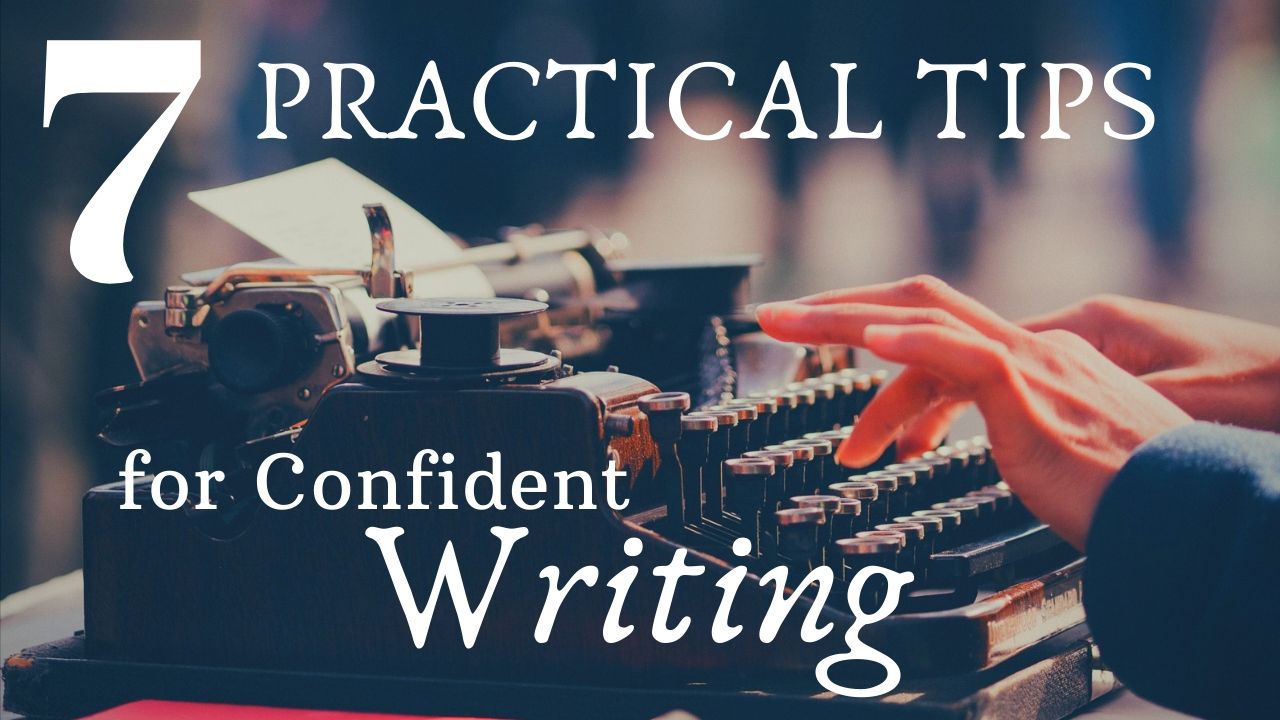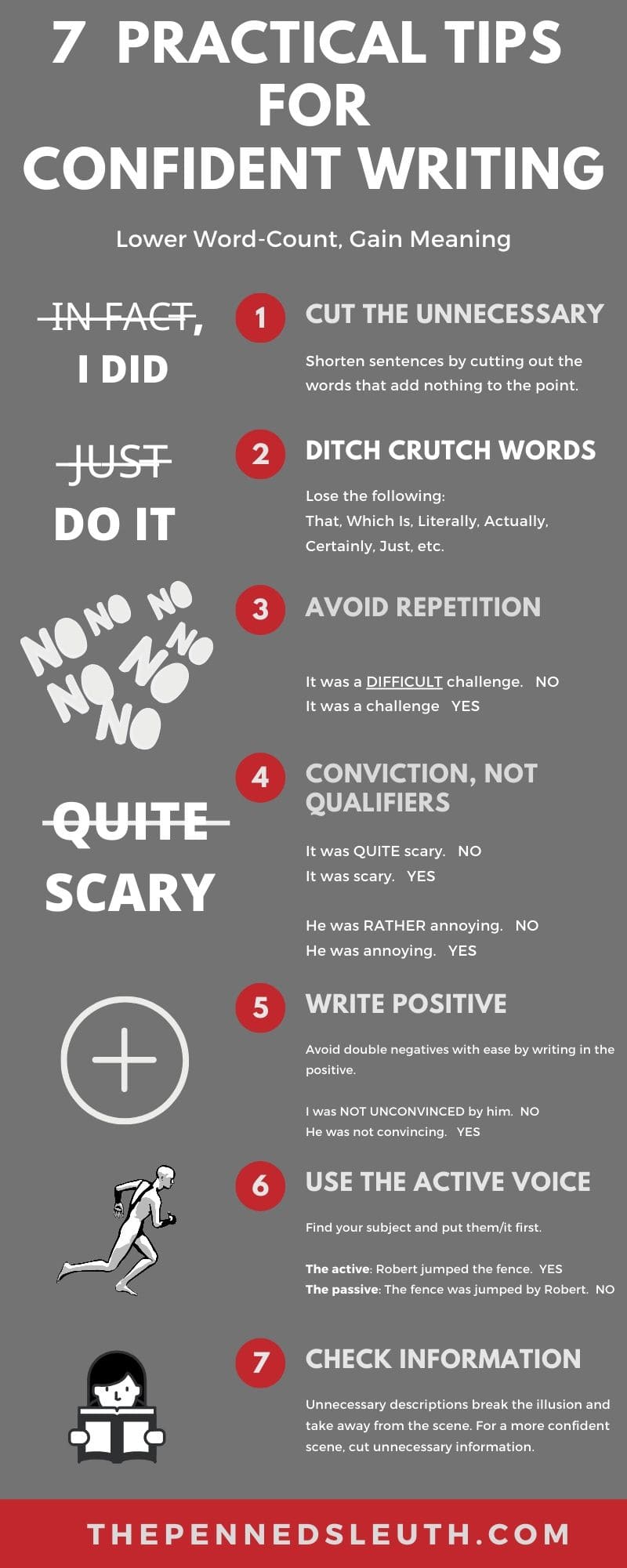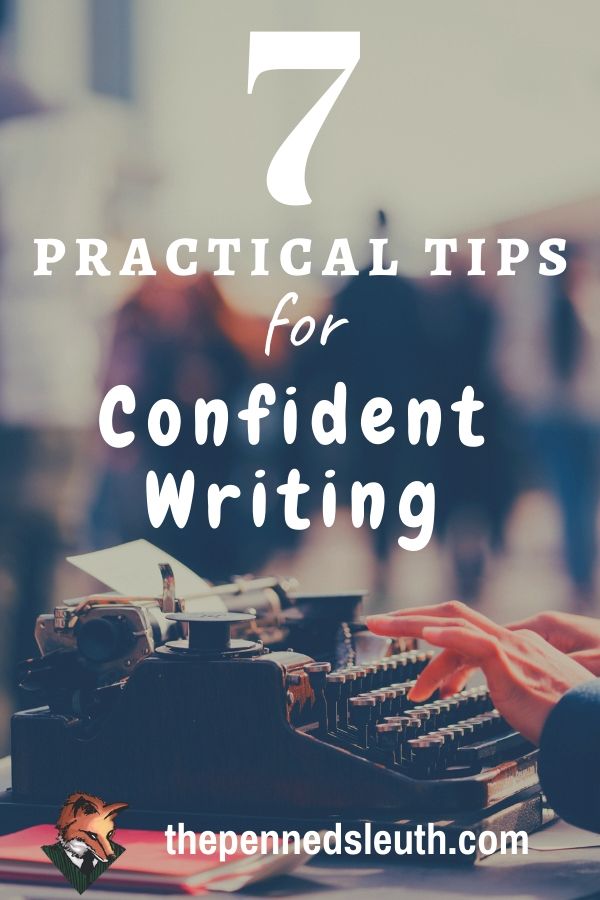Latest Writing Video! |
|
Confident writing is a sure-fire way to let your reader know they are in for a great story. Avoiding the basic mistakes, such as flowery language, helps you create a more believable world. You show your belief in the world through the language you use and confident writing is exactly how you do that. Here are 7 practical tips for confident writing! 1. Cutout the Unnecessary WordsWe have picked up many unnecessary words through our education and practice. Words that take away from a sentence, rather than add. It’s almost criminal to waste your time and get the opposite of the results you expected. It goes without saying, writing with confidence requires conscious writing. ̶I̶t̶ ̶g̶o̶e̶s̶ ̶w̶i̶t̶h̶o̶u̶t̶ ̶s̶a̶y̶i̶n̶g̶,̶ writing with confidence requires conscious writing. Writing ̶w̶i̶t̶h̶ ̶c̶o̶n̶f̶i̶d̶e̶n̶c̶e̶ requires conscious writing. Confident writing requires conscious writing. It is easy to pick and choose which words you don’t need. Suddenly, you are writing powerful sentences with fewer words. Avoid the long-running sentences, avoid the words that don’t add to the point you are trying to make. That is the first step towards confident writing. 2. Ditch the Crutch WordsThere is a collection of words out there we have grown accustomed to using. These are the words that hold our writing back. The words we depend upon to convey a sequence of thoughts in our writing. These words are “which is” and “that”. You need to avoid these two in particular to improve your writing, as these are the crutch words that take away from your confidence. Although, yours might not be “which is” and “that”, it can also be “definitely”, “actually”, “certainly”, “literally” etc. It is through rephrasing that we can easily avoid using these words. He drove down the street while on the phone, which is wrong. He wrongly drove down the street using his phone. She is certainly furious with you. She is furious with you. I’m actually a doctor. I’m a doctor. Identify these words in your writing and remove them. Confident writing has no room for crutch words such as these. 3. Check for RepetitionThere are points in your writing where you have no doubt repeated yourself. Some are more obvious, such as repeating the same phrases or even sentences, but others are oxymorons that are a little more difficult to spot; this is known as a tautology, the unnecessary and often unintentional use of repetitions. Repetition dilutes a phrase or point, making it clear that you should avoid it. Keep a look-out for oxymorons such as this. It was a difficult challenge. It was a challenge. It is an unsolved mystery. It is a mystery. Simple problems easily solved, but problems all the same. These are mistakes that you may only notice with more conscious writing. Yet, in rectifying these errors your writing starts to ring of power and confidence. 4. With Conviction, Not QualifiersYou will find this practical tip similar to crutch words, but it comes down more to phrasing than specific words. Normally, you will lose conviction through the use of flowery language. The abundant verbiage leaves you with sentences lacking in purpose. Writing that lacks conviction is one step away from becoming small-talk. You can spot a distinct lack of conviction when you cross a qualifier. These are words used to limit or enhance the impact of an adjective. An example of this would be as follows: It was quite scary. It was a rather annoying turn-of-phrase. These are words that are commonly used in speech with more formal or old-school characters, but in narration and writing it has no place. Qualifiers lessen or enhance the impact, which in turn is changing the root feeling or meaning you are trying to convey. It was scary. It was an annoying turn-of-phrase. The sentences are now clear. The raw impact of those words is a lot more preferable to the impact of the words when diluted or concentrated by a qualifier word. 5. Write in the PositiveWriting in the positive will help you avoid the horror of double-negatives. While double-negatives have a place in poetry and more metaphorical work, in writing it only serves to create a conflict of thoughts. I was not unconvinced by what you have told me. A sentence like that rings with a lack of confidence, which is not the objective of these tips. The sentence reads more like; I was convinced by what you have told me. It would be best to rephrase the sentence to convey the true meaning of what the writer wants to convey. The result being: You were not convincing. Now the sentence is free of double-negatives and ambiguity. It is clear and confident. 6. Use Active VoiceOne of the first barriers a writer must breakthrough is the use of passive voice. It goes without saying that the passive voice lacks the confidence of the active voice, but more than that, it leads to amateurish writing. The active voice is used more commonly as the conviction of the phrasing makes a scene more immersive. The active: Robert jumped the fence. The passive: The fence was jumped by Robert. The active: The medicine cured Susan. The passive: Susan was cured by the medicine. Simply identify the subject of your sentence and put it first. Be it a character you are narrating or an object you are discussing. The active voice will always read better than the passive voice, ensuring confident writing instead of weaker writing. 7. Check Your InformationThe final point to discuss is information. The information you provide the reader in your novel should be analysed. You cannot give your reader information that they either need not know or should not know. It is this mistake that can lead to padding or a shaky plot. Yet, it is more than likely that the information you provide is simply unnecessary, rather than jeopardizing the plot. Check your object descriptions. Does your character open the front door or do they open the oak front door, which is hand-made by a German carpenter who used to live in the building? Unless this information is crucial, it might be better to say they open the front door and leave it at that. ConclusionConfident writing can turn a mediocre story into a brilliant one. It is this form of writing which adds power to the worlds you create, that sense of immersion as the readers feel that they are there. Passive writing easily breaks that illusion, that drags a scene on and distracts from the main point. If you keep these seven practical tips in mind, you should have no problem writing a fantastic book. A book a reader can believe and enjoy, no matter how unbelievable the story may be. It is because you write with confidence that the events of your novel can be fantastical, yet as gripping as reality. Thank you for reading and as always… Good day, goodnight and happy writing! Thank YouDear Writer, As a big thank you for reading this article I would like to offer you something for FREE! A writing course on how to improve your main character! Click here to check out your course. To receive more content, bonuses and some big discounts on future courses, join the writer’s group here. Thank you for reading! Kind regards Matthew Dewey, Writer Pin for Later
0 Comments
Leave a Reply. |








